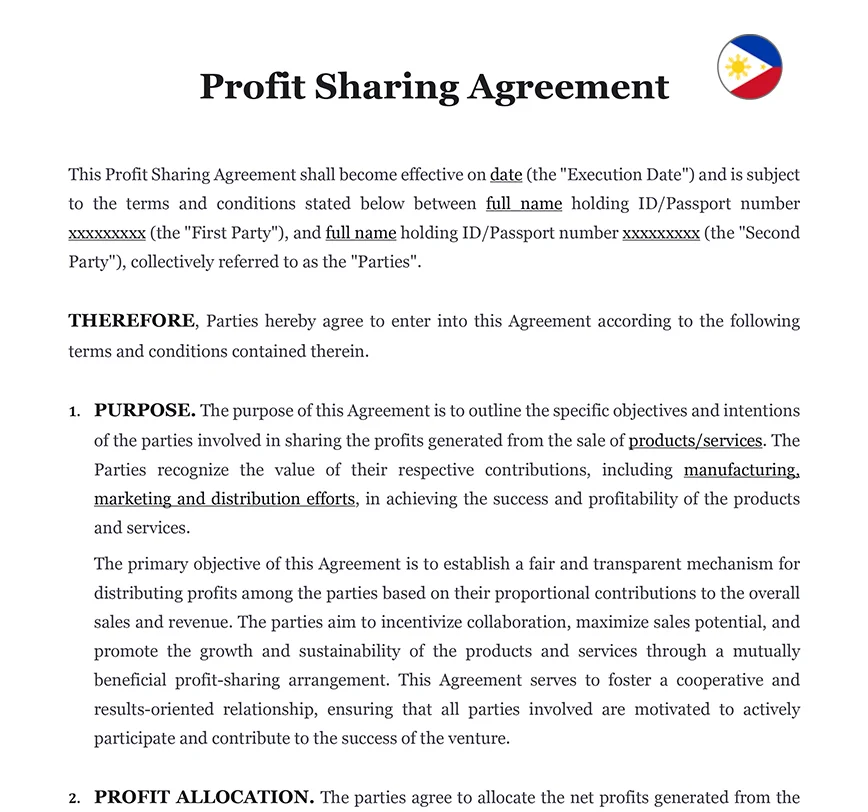Ready to use legal template
Drafted by experienced lawyers
Compliant with Filipino law
Ready to use legal template
Drafted by lawyers
Compliant with Filipino law
Home › Business contracts › Profit Sharing Agreement
Learn more about Profit Sharing Agreement in Philippines
Implementing a Profit Sharing Agreement in the Philippines is a strategic marketing move that fosters a collaborative and incentivized work environment, ultimately driving business growth and success. By offering employees a share in the company’s profits, businesses demonstrate a commitment to recognizing and rewarding their valuable contributions. This creates a sense of ownership and motivation among employees, enhancing their dedication and productivity. A Profit Sharing Agreement serves as a powerful tool to attract and retain top talent, positioning the company as an employer that values and invests in its workforce. Moreover, this agreement can generate positive word-of-mouth and attract potential customers who appreciate businesses that prioritize fair and equitable practices.
Table of contents
-
What is a Profit Sharing Agreement?
-
Why are Profit Sharing Agreements important in Philippines?
-
What does a Profit Sharing Agreement include?
-
What are the legal requirements in Philippines?
-
How do you determine the profit shared ratio?
-
How can fairness and transparency be ensured?
-
What are the tax implications of profit sharing?
-
How is the termination of Profit Sharing Agreement?
What is a Profit Sharing Agreement?
A Profit Sharing Agreement is a legally binding agreement between parties that outlines how profits will be distributed among them. It establishes the terms and conditions regarding the allocation of profits generated by a business or project. In the context of the Philippines, a Profit Sharing Agreement defines the rights, responsibilities, and entitlements of the parties involved in sharing the profits.
Why are Profit Sharing Agreements important in Philippines?
Profit Sharing Agreements are important for businesses in the Philippines for several reasons. Firstly, they provide clarity and transparency regarding the distribution of profits, ensuring that all parties involved are aware of their share. This helps to build trust and maintain positive relationships among the stakeholders. Secondly, Profit Sharing Agreements incentivize employees or partners by aligning their interests with the success of the business. It motivates them to work towards generating profits and achieving the business goals. Additionally, Profit Sharing Agreements can attract and retain top talent, as they offer the potential for financial rewards based on performance. Profit Sharing Agreements contribute to a fair and equitable distribution of profits, fostering a positive and productive work environment.
What does a Profit Sharing Agreement include?
A well-drafted Profit Sharing Agreement should include several key elements to ensure clarity and avoid misunderstandings. Firstly, it should clearly define the parties involved and their roles in the profit-sharing arrangement. This includes specifying whether it is between the business and its employees, between business partners, or between the business and external stakeholders. Secondly, the contract should outline the method for calculating the profits and the specific percentage or ratio to be shared among the parties. It is important to define how the profits will be determined, such as net profits, gross profits, or a specific formula. Additionally, the contract should address any conditions or requirements for profit distribution, such as achieving certain financial targets or meeting performance goals. Other important elements to consider include the frequency of profit distribution, the timing of payments, dispute resolution mechanisms, confidentiality clauses, and termination provisions.
ℹ️ Themis Partner can help you get a Non-Disclosure Agreement to ensure confidentiality and protect your company’s interests.
What are the legal requirements in Philippines?
1. Contractual Capacity
All parties involved in the Profit Sharing Agreement must have the legal capacity to enter into a contract. This means they must be of legal age, mentally competent, and not disqualified by law from entering into contracts.
2. Consent
The contract must be entered into voluntarily, with the free and informed consent of all parties. There should be no fraud, duress, or undue influence involved in obtaining consent.
3. Form
In the Philippines, contracts may be either written or verbal. However, it is highly recommended to have the Profit Sharing Agreement in writing to provide clarity, prevent disputes, and facilitate enforcement. A written contract also allows for easier reference and proof of the agreed-upon terms.
4. Clear Terms and Consideration
The Profit Sharing Agreement should clearly state the terms of profit sharing, including the percentage or ratio of profits to be shared among the parties. It should also define the basis for calculating profits and specify any conditions or criteria for profit distribution. Additionally, the contract should outline the consideration or benefit that each party receives in exchange for sharing profits.
5. Compliance with Labor Laws
If the Profit Sharing Agreement involves employees, it must comply with relevant labor laws, including the provisions of the Labor Code of the Philippines. This includes ensuring compliance with minimum wage laws, benefits, working hours, and other labor standards.
6. Compliance with Tax Laws
The Profit Sharing Agreement should consider the tax implications of profit sharing. It is essential to comply with tax laws and regulations, including the proper withholding and remittance of taxes on shared profits. Consultation with tax professionals and adherence to tax requirements is crucial to avoid penalties or legal issues.
7. No Violation of Prohibited Transactions
The Profit Sharing Agreement should not involve any prohibited transactions or activities that are illegal, against public policy, or in violation of any regulatory restrictions.
8. Enforceability
The terms and provisions of the Profit Sharing Agreement should be enforceable under Philippine law. It is advisable to use legal services and ensure that the contract’s provisions do not violate any laws or public policy.
How do you determine the profit shared ratio?
The determination of the profit sharing ratio in a contract depends on various factors and is subject to negotiation between the parties involved. There is no fixed formula for determining the profit sharing ratio, as it can vary based on the specific circumstances and agreement between the parties. In some cases, the profit sharing ratio may be based on the capital contribution of each party or the level of involvement and responsibilities assumed. Alternatively, it can be determined based on a predetermined percentage agreed upon during negotiations. It is important for the parties to consider factors such as the nature of the business, the level of risk undertaken, the skills and expertise contributed, and the anticipated level of profits. The profit sharing ratio should be fair and equitable, taking into account the interests and contributions of each party. It is recommended to engage in open and transparent discussions to reach a mutually acceptable profit sharing ratio that aligns with the goals and expectations of all parties involved.
How can fairness and transparency be ensured?
Fairness and transparency are essential in Profit Sharing Agreements to maintain trust and ensure a harmonious relationship among the parties involved. To promote fairness, it is important to establish clear and objective criteria for profit allocation. This can include factors such as the level of contribution, performance metrics, or a predetermined formula. It is advisable to document these criteria in the contract to provide a transparent framework for profit sharing. Regular and timely communication is also crucial to ensure transparency. Sharing financial information, such as profit calculations and relevant business metrics, can help all parties understand how profits are generated and distributed. Additionally, maintaining open lines of communication and addressing any concerns or questions can foster a sense of trust and fairness. It is also recommended to establish a mechanism for dispute resolution in case any disagreements arise. This can include mediation or arbitration processes that provide a fair and impartial resolution to any disputes. By promoting fairness and transparency in Profit Sharing Agreements, businesses can build strong and sustainable partnerships based on mutual trust and respect.
What are the tax implications of profit sharing?
Profit Sharing Agreements in the Philippines may have tax implications that need to be considered by all parties involved. The distribution of profits under a Profit Sharing Agreement may be subject to income tax. It is important to consult with tax professionals or seek advice from the Bureau of Internal Revenue (BIR) to ensure compliance with tax regulations. The tax treatment of profit sharing depends on various factors, including the legal structure of the business, the nature of the profit sharing arrangement, and the applicable tax laws. For instance, if the profit sharing involves employees, it may be subject to withholding tax obligations by the employer. On the other hand, if the profit sharing involves business partners or shareholders, it may be subject to different tax treatments, such as dividend taxation or capital gains tax. It is essential to understand and comply with the tax obligations arising from the profit sharing arrangement to avoid any penalties or legal issues. Seeking professional tax advice and proper tax planning can help ensure compliance and optimize the tax implications of profit sharing.
ℹ️ Themis Partner also provide a Shareholders Agreement to help you manage your company.
How is the termination of Profit Sharing Agreement?
The termination of Profit Sharing Agreements in the Philippines should be handled in accordance with the terms and conditions specified in the contract itself. The contract should outline the procedures and mechanisms for terminating the profit sharing arrangement. It may include provisions related to the termination notice period, the rights and obligations of the parties upon termination, and any post-termination provisions. It is important to carefully review the termination clauses in the contract to understand the rights and responsibilities of each party. Additionally, it is advisable to consider any legal requirements or statutory provisions that may apply to the termination of the contract. For instance, if the profit sharing arrangement involves employees, it should comply with the termination provisions outlined in the Labor Code of the Philippines. Consulting lawyers can ensure that the termination process is conducted in a legally compliant manner. Proper communication and documentation of the termination process are crucial to avoid any misunderstandings or disputes. By following the specified termination procedures and seeking legal guidance, businesses can effectively handle the termination of Profit Sharing Agreements in the Philippines.
SPECIAL OFFER
Startup
15 Document Package
Essential documents for running your business in the Philippines
Profit Sharing AgreementTemplate (.docx)
Save on attorney fees
310 client reviews (4.8/5) ⭐⭐⭐⭐⭐
Share information
Why Themis Partner ?
Make documents forhundreds of purposes
Hundreds of documents
Instant access to our entire library of documents for Philippines.
24/7 legal support
Free legal advice from our network of qualified lawyers.
Easily customized
Editable Word documents, unlimited revisions and copies.
Legal and Reliable
Documents written by lawyers that you can use with confidence.




